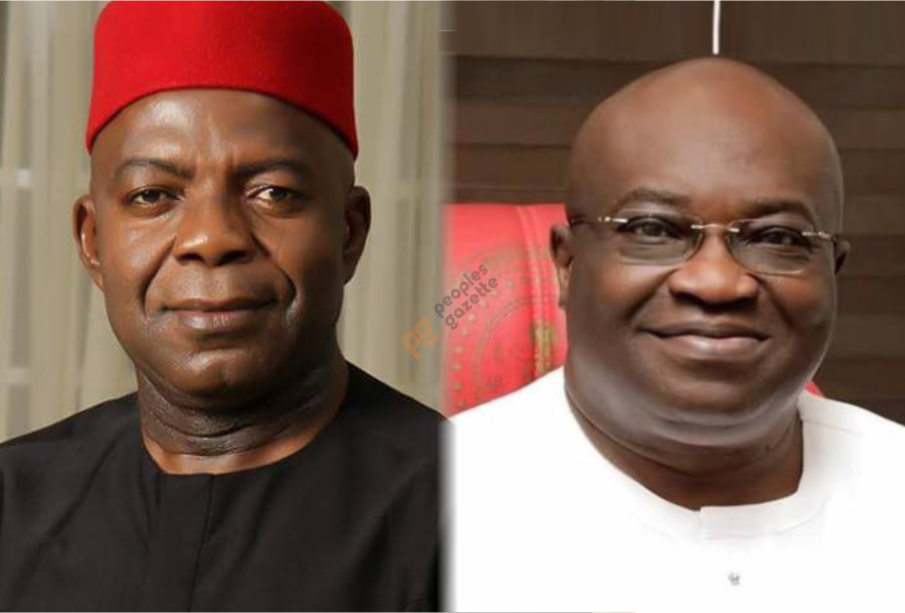Application of common sense in leadership versus propaganda (Opinion)

Alex Otti and Abi State Governor Okezie Ikpeazu
By John Okiyi Kalu
There are three issues most national opinion molders hold against former Governor of Abia State, Dr Okezie Ikpeazu: N500 for pregnant women; hunters and palm wine tappers as Ebubeagu operatives, and Chicken Republic as metaphor for economic growth.
While the then governor might not have used the language of the media to explain those issues, it has always been clear to me his actions were common sense solutions that should be studied and applauded.
According to Section 14(2) (b) of the 1999 (amended) Constitution of the Federal Republic of Nigeria, the security and welfare of the people shall be the primary purpose of government. It is left for every leader in government to evolve policies and programs that will deliver on the purpose of its existence. It follows therefore that a successful government in Nigeria is one that fulfills the purpose of its existence and not the one that made the most noise in the media. While some leaders prefer to silently do their job, others deploy media noise as their cardinal focus of governance.
Common sense is simply the ability to think and behave in a reasonable way and to make good decisions
Common sense leadership dictates that in prescribing solutions to a challenge, leaders must think things through, have good knowledge of the environment and use what they have (including human and financial resources) in the right mix to deliver and sustain good governance.
N500 to pregnant women in Abia State
While reviewing data on maternal and infant mortality in Abia State, it was discovered that most women in rural Abia preferred to use the services of traditional birth attendants whose methods have long been judged to be crude and unsafe by health authorities. Yet, those birth attendants were the closest to rural women.
Ikpeazu’s solution was to equip and proliferate primary healthcare centers (PHCs) accross the state (over 700 located in 184 wards of the state) and link them to a 24/7 Telehealth center (dial-a-doc) located inside government house, Umuahia, with medical doctors on call to attend to issues from all the PHCs. With that firmly established, the challenge was how to get pregnant rural women to visit the healthcare centers instead of patronizing traditional birth attendants.
Governor Ikpeazu decided to incentivize change by simply approving N500 for transport to a healthcare facility to be paid on every visit. The implication was that if a pregnant woman visited 20 times for checks, she would collect N500 multipled by 20. In addition to that, every pregnant woman was offered free birth pack, valued at more than N40,000 at the time, as well as delivery at zero cost.
In most public hospitals in Nigeria it costs at least N200,000 to deliver a baby.
Available data clearly shows that as a result of the common sense measures put in place by Governor Ikpeazu, attendance to healthcare facilities in Abia increased by 71% under his watch with maternal/infant mortality rate dropping by more than 30%. In fact, the World Health Organization and the federal ministry of health issued its first and only gold award for Primary Healthcare Under One Roof to Governor Okezie Ikpeazu for doing an excellent work.
Hunters, Palmwine Tappers and Ebubeagu
In the days when the formation of a regional security force was popular within the South-East, there were two major related security issues: farmers-herdsmen clashes and kidnapping for ransom. At the heart of the two security challenges were reports of armed gangs living in forests in Igbo land from where they attacked security agents and innocent folks then take their victims back to the forests until ransom was paid.
Our people wanted the criminals removed from our forests and believed that the formation of an armed Ebubeagu force would achieve that. But Governor Ikpeazu was not convinced about arming Ebubeagu because he recalled the extra-judicial activities of the defunct Bakassi Boys that led to loss of several innocent lives in our state and said something profound during one of the meetings of the state executive council:
“No doubt, we have a problem and must solve it but we should ask ourselves this: if we arm our people to fight the criminals how do we retrieve the arms afterwards and what will a hungry man with skills in use of arms do when people are not looking?”
We decided that since there were conventional armed security forces like the police, army, navy, DSS, civil defence and others operating within our state the solution should be to empower and deliver prompt and precise information to them to ensure they do the job for which they receive salary. We approved massive support (financial incentives, vehicles, communication gadgets, monitoring and control centers, modem operational structures etc), from the government of Abia State to those agencies.
In addition to increased funding for regular security forces, improvements in crime fighting infrastructure, we also approved take off resources for Ebubeagu strictly as community-based information and intelligence gathering outfit that did not bear arms while concurrently developing a second-to-none information sharing structure between the government and security agencies. I make bold to state that under Ikpeazu it was near impossible for new faces to enter any of our communities without the information coming to the center in Umuahia. Suspicious visitors were monitored until they left or were interrogated by regular security agents.
The result of Ikpeazu’s common sense approach was that Abia became the oasis of peace in a troubled South- East region and among the top three safest states in Nigeria. In contrast, those states that celebrated armed Ebubeagu with popular applause recorded higher crime waves and widespread insecurity that still haunt the states to date.
Ikpeazu received national awards on security without toeing the popular path but rather applying common sense approach to leadership.
Chicken Republic as a metaphor for economic growth
While answering questions on investment and economic growth under his watch, Governor Okezie Ikpeazu cited proliferation of Chicken Republic Restaurant branches in the state as evidence of improvement. The usual crowd decided to make a joke out of it without reviewing to understand where he was going with that. But few correctly understood his example to mean that inceased consumption and patronage for luxury food brands signpost growth in economic activities within a location.
Permit me to briefly digress with VAT collection before returning to the Chicken Republic metaphor.
Definitionally, VAT refers to a consumption tax on goods and services levied at each stage of the supply chain where value is added. It goes without saying that its volume in a locality can be used as an indication of the volume of buying and selling in the area. So states with low economic activities usually have low VAT collection and vice versa.
Recently, NBS reported that Abia State has dropped to 35th position on VAT remittances. With an economist as the current Governor of the state he should ordinarily be worried because the ranking shows very low and declining economic activities within the state. More crucially, it is a valid indicator that whatever the government is spending in terms of construction, payment to workers etc are not being felt in the state but rather being siphoned out of the state. A government that claims to have spent more than N300 billion in infrastructure and salaries should be worried that VAT collection is declining on its watch.
It is also very easy to guess that low VAT collection means outfits like Chicken Reoublic are making much less than they were doing before now and if that trend continues they will close shops in Abia and go elsewhere. Meanwhile, the propaganda mill says Abia has improved a million times under the incumbent Governor but simple check with independent data suggests otherwise to the educated mind. The situation raises very profound issues for further research on what is happening to Abia money.
So, when Governor Ikpeazu pointed to proliferation of Chicken Republic and such other outfits on his watch he was rightly advancing the case that economic activities were improving including investment in the state from outside. He was simply saying money was flowing into his state and the economic wellbeing of his people was improving on his watch. VAT receipts and other data supported his position.
When the NBS, World Bank and relevant federal government agencies studied multi dimensional poverty index across the country they rated Ikpeazu’s Abia as the third best in Nigeria with indicators that included employment, healthcare, security and economic growth. What does that say to you about common sense approach to leadership compared to high sounding propaganda?
-Chief John Okiyi Kalu is a former Commissioner for Information, Trade & Investment in Abia State











